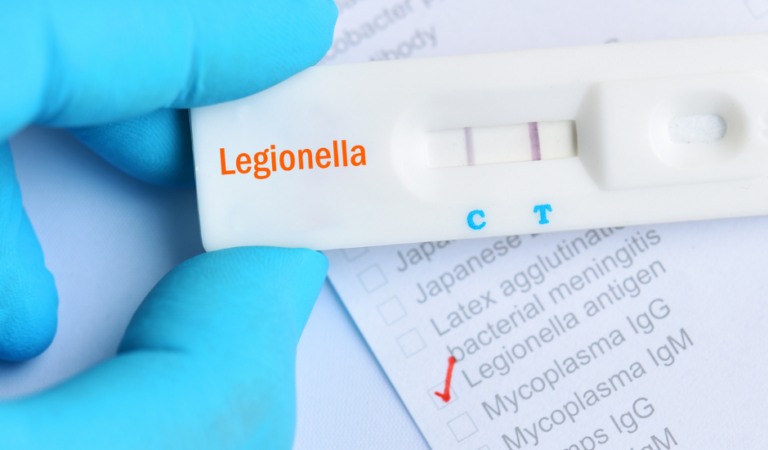 11th July 2022
11th July 2022Legionella Prevention: What is ACOP L8?
The biggest Legionella prevention method is keeping water storage tanks in good condition and cleaning them regularly in order for them to function efficiently and safely.
Cold water storage tanks can be at risk of Legionella bacteria for several reasons. It could be due to the water pressure causing cracks or corrosion. Or it could be simpler than that. A dirty tank can also be a breeding ground for Legionella bacterium.
So in this blog, we’re going to tell you what legionella is and the purpose of the ACOP L8 guidance.
What is Legionella?
The bacterium Legionella is a hazardous bacteria that is found in water. In the prime conditions, water that is between 20-40 degrees Celsius, it will grow even inside a water tank.
Legionella is hazardous because inhaling or ingesting water contaminated with this bacteria can lead to the infectious Legionnaires’ disease.
What is Legionnaires’ Disease?
Legionnaires’ disease is caused by legionella bacteria and is a potentially fatal form of pneumonia. Everyone is susceptible to this infection but the risk certainly increases depending on age and circumstance.
The Legionella pneumophilia bacterium is common in natural water sources but typically in low numbers. In purpose-built water systems they may be more commonly found in high numbers as conditions are often favourable in some tanks. Favourable conditions leads to an increase in the growth of this bacteria.
Therefore appropriate measures for controlling Legionella risks was outline in the Approved Code of Practice L8 (ACOP L8) was written up.
What is ACOP L8?
ACOP L8 is the acronym for the Approved Code of Practice Legionnaires’ disease: the control of legionella bacteria in water systems. It outlines measures that need to be taken to reduce the risks of Legionella as well as guidance on Legionella prevention.
It sets out practical guidance that should be followed through, for example Legionella Risk Assessments, in order to properly comply with Health and Safety Executive (HSE) regulations.
Owners and landlords are actually at risk of facing prosecution for breach health and safety law if they choose not to follow the advice in the L8 code.
Who is ACOP L8 For?
Any premises in which water is used or stored and where there is a means of creating or transmitting water droplets that can be inhaled. These are the premises where owners, managers, and other high ranking employees need to be following the guidance laid out.
It is specifically aimed at duty holders and those in control of the premises as they have health and safety responsibilities towards the employees. Duty holders and employers should be following the ACOP L8 guidance in order to help them comply with any legal duties they have, especially in relation to Legionella prevention.
Why is ACOP L8 Important?
Really, ACOP L8 helps duty holders understand important controls they must carry out correctly for Legionella prevention.
Some of those things, for example, are helping duty holders understand how to carry out Legionella risk assessments as well as the signs they should look for. Also, it helps them to understand which controls should be implemented to mitigate certain risks.
You should know that ACOPs have a special legal status. Although you aren’t precisely required to follow the guidance by law, you can be prosecuted for a breach of health and safety law if you cannot prove you followed relevant ACOP guidance. Then you have to demonstrate that you have been complicit in another way.
So it’s better to actually follow the guidance in the ACOP L8.
How Do I Comply with the ACOP L8?
In order to comply with the code, duty holders should:
- Identify and assess risk sources.
- Prepare written schemes on the prevention or control of the risk.
- Implement, manage, monitor precautions.
- Keep records of everything.
- Appoint someone with sufficient knowledge, authority, and competency to help in being compliant with law – it’s a demanding thing for only one person to do so assigning another person with extra duties would be very beneficial (and is actually highly recommended).
The risk assessment, potential control measures and reviewing control measures is covered in the ACOP L8 guidance. As well as that, it also outlines the role of the responsible person and the obligations of people responsible for the supply of water systems.
A Legionella risk assessment is typically carried out every two years at least but that’s a rule that has to be stuck to. If you’re concerned about the quality of the water stored in your water tank you should consider doing a risk assessment.
Clarion Water: Contact Us
Here at Clarion Water we have a collective of 30+ years knowledge and experience in the water industry. When it comes to cold water tank services, we know what we’re doing.
We can ensure that your tank receives top-quality care and maintenance to make sure it’s functioning effectively.
Clarion Water can help you out if you’re looking to get your tank relined or repaired. If you’re thinking of getting a water tank installed, let us know!
Reach out and we’ll get back to you as soon as we can – our team is happy to help! Try calling us on 01943 872311 or send us an email at info@clarionwater.co.uk.